Privacy and data protection
Privacy and data protection are essential for us to live, connect, work, create, organise and more. Governments and companies have long used mass surveillance for control trying to legitimise snooping for health, security or other reasons. The near-total digitisation of our lives has made it easier to control, profile and profit from our attention, data, bodies and behaviours in ways that are very difficult for us to understand and challenge. European data protection standards such as the GDPR are a good step forward but we need more to effectively ensure enforcement and protection against unlawful surveillance practices.
Filter resources
-
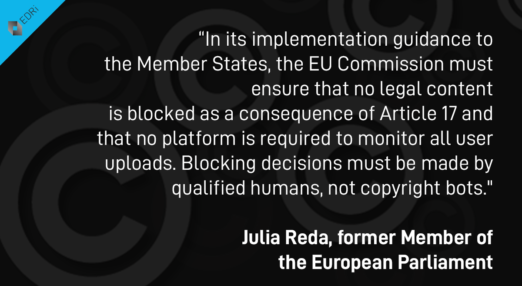
Upload filters? Still no, thanks
Together with thousands of protestors, EDRi has fought against mandatory upload filters in the Copyright Directive. Despite the Directive having been adopted, including the infamous Article 13 (now 17) that could lead to upload filters, the Directive allows for some flexibility to prevent the worst impacts on our freedom of expression.
Read more
-

Keep private communications private
On 27 July, the European Commission published a Communication on a EU strategy for a more effective fight against child sexual abuse material (CSAM). The Communication indicates that messaging services (WhatsApp, Facebook Messenger…) may see their privacy protections undermined under new legislation that will be proposed this week.
Read more
-

Down with (discriminating) systems
Amidst a particularly hectic time for digital rights policy in Europe, there remains a large elephant in the room.
Read more
-
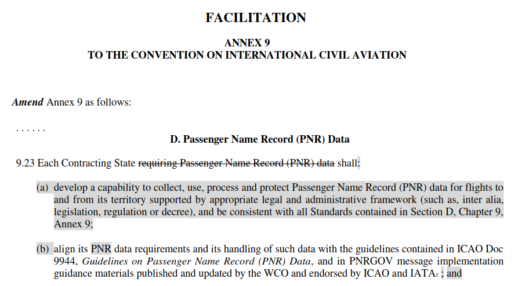
ICAO mandates worldwide government surveillance of air travelers
Playing out the endgame we predicted last year of a two-decade campaign by the US government to establish a global regime of government surveillance of air travelers, the International Civil Aviation Organization (ICAO) has adopted an amendment to the Chicago Convention on Civil Aviation that will require each of the 193 state parties to that treaty — essentially every national government in the world — to require all airlines operating international flights to provide a designated government agency with complete mirror copies of all reservation records (“Passenger Name Records“) in a standard PNRGOV transmission format.
Read more
-

SHARE Foundation presents #hiljadekamera : A documentary on biometric mass surveillance
SHARE Foundation has recently released a short documentary on the controversial use of the mass surveillance system in Belgrade, Serbia. Various digital experts and activists took part in the documentary, including the national Data Protection Authority in Serbia and EDRi's own Policy and Campaigns Officer, Ella Jakubowska.
Read more
-
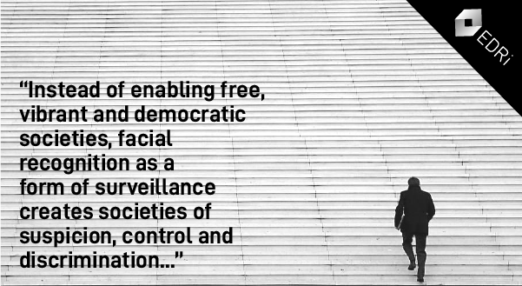
IBM’s facial recognition: the solution cannot be left to companies
On 8 June 2020, IBM’s CEO announced to the US Congress that – on the grounds of “justice and racial equity” – the company would “sunset” its “general purpose” facial recognition technologies. EDRi has addressed the company through a letter, but IBM's response suggests the organisation is motivated by public relations, instead of fundamental rights.
Read more
-
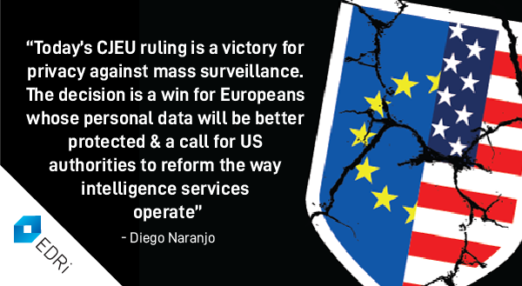
A victory for us all: European Court of Justice makes landmark ruling to invalidate the Privacy Shield
Today, 16 July 2020, the Court of Justice of the European Union (CJEU) invalidated the EU-US Privacy Shield. The ruling proves a major victory for EU residents on how their personal data is processed and used by platforms like Facebook.
Read more
-

Europol: Non-accountable cooperation with IT companies could go further
There is an ongoing mantra among law enforcement authorities in Europe according to which private companies are indispensable partners in the fight against “cyber-enabled” crimes as they are often in possession of personal data relevant for law enforcement operations. For that reason, police authorities increasingly attempt to lay hands on data held by companies – sometimes in disregard to the safeguards imposed by long-standing judicial cooperation mechanisms.
Read more
-

Spain: Catalan government agrees to improve privacy in schools
The Catalan Department of Education has signed an agreement accepting the plan proposed by Xnet, EDRi member from Spain, titled “Privacy and Democratic Digitization of Educational Centers,” to guarantee the privacy of data and the democratic digitization of schools. The plan foresees the creation of a software-pack and protocols that ensure the educational establishments have alternatives to what until now seemed the only option: the technological dependence on Google and its attached elements, with worrying consequences on individual data.
Read more
-

Web browser privacy: ARTICLE 19 welcomes initiatives to protect users
There are widespread web tracking practices that undermine users’ human rights. However, safeguards against web tracking can and are being deployed by various service providers. EDRi member ARTICLE 19, and more generally EDRi as a whole, support these initiatives to protect user privacy and anonymity as part of a wider shift toward a more rights-respecting sector.
Read more
-
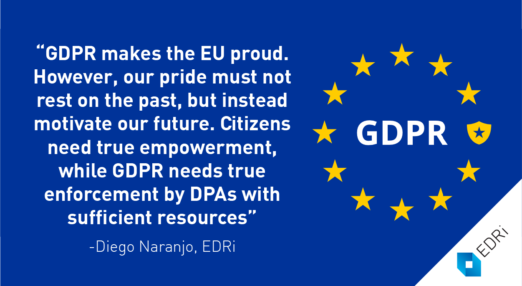
EU must let its crown jewel shine: GDPR needs progress
On 24 June, the European Commission published the Communication reviewing of the two years of application of the General Data Protection Regulation (GDPR) The Communication received input from the multistakeholder expert group on the application of the GDPR, of which EDRi members Access Now and Privacy International belong to.
Read more
-
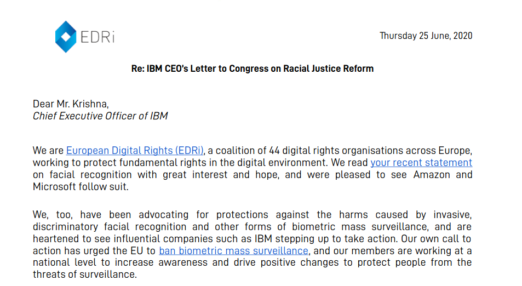
Open Letter: EDRi calls on IBM to clarify stance on facial recognition
On 25 June, EDRi sent an open letter to the CEO of IBM in response to their 8 June statement on racial equality and facial recognition in the US.
Read more
